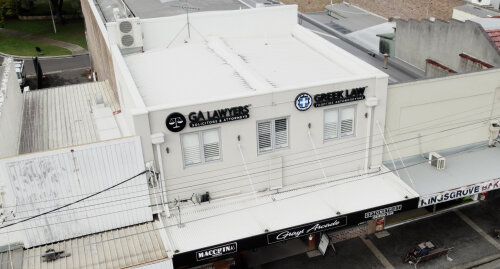Best Insurance Lawyers in Australia
Share your needs with us, get contacted by law firms.
Free. Takes 2 min.
Or refine your search by selecting a city:
List of the best lawyers in Australia
About Insurance Law in Australia
Insurance law in Australia is governed by a combination of common law principles and statutory regulations. The primary legislation includes the Insurance Contracts Act 1984, which regulates the terms and conditions of insurance contracts, and the Corporations Act 2001, which governs the conduct of insurance companies. Australia’s insurance market is highly developed, offering a broad range of products catering to individuals, businesses, and industries. The regulatory framework ensures consumer protection, promotes transparent practices, and ensures the stability and reliability of the insurance sector.
Why You May Need a Lawyer
Legal assistance in insurance matters is often necessary in various situations. Here are some common situations where you may require a lawyer's expertise:
- Claim Denials: Insurance companies might deny claims citing policy exclusions or misinterpretation of terms.
- Policy Disputes: Ambiguities in insurance policies can lead to disputes regarding coverage scope.
- Bad Faith Conduct: An insurer may act in bad faith by delaying or unfairly handling a claim.
- Complex Insurance Products: Some insurance products need legal expertise for interpretation and application.
- Fraud Allegations: Legal advice may be necessary if fraud is alleged by or against the insurer.
Local Laws Overview
Several key aspects of local insurance laws in Australia are particularly relevant:
- Duty of Disclosure: Before entering into a contract, the insured must disclose all relevant information that might affect the insurer's decision to provide coverage.
- Utmost Good Faith: Both parties in an insurance contract must act with utmost good faith, ensuring fairness and honesty.
- Prudential Regulations: The Australian Prudential Regulation Authority (APRA) oversees insurance companies to ensure financial safety and reliability.
- Claims Handling: Insurers are required by law to handle claims promptly and transparently, as per the Insurance Code of Practice.
- Third-Party Rights: Certain conditions allow third parties to claim directly from insurers.
Frequently Asked Questions
What is an insurance contract?
An insurance contract is a legal agreement between the insurer and the insured, outlining the terms and coverage of the insurance policy.
What should I do if my claim is denied?
If your insurance claim is denied, you should first request a detailed explanation from the insurer and consider seeking legal advice to challenge the denial if necessary.
What is 'duty of disclosure' in insurance?
The duty of disclosure requires an insured to inform the insurer of any facts that could influence the insurer's decision to underwrite the risk.
Can I cancel my insurance policy at any time?
Most insurance policies allow cancellation, but terms vary, and there may be penalties or fees. It's important to review your specific policy's cancellation terms.
What does 'bad faith' mean in insurance claims?
Bad faith refers to unfair practices by an insurer, such as unjustly denying a claim or failing to process it in a timely manner.
How can I ensure my insurance covers all necessary risks?
Assess your needs thoroughly and review policy terms with an insurance adviser or lawyer to ensure comprehensive coverage.
What recourse do I have if I'm unsatisfied with my insurance settlement?
If you're unsatisfied with the settlement, you can dispute it through the insurer's internal review process and potentially seek a resolution via the Australian Financial Complaints Authority (AFCA).
How does the Insurance Code of Practice protect me?
The Insurance Code of Practice provides guidelines for fair conduct by insurers and includes provisions on claims, complaints, and dispute resolution.
Is it necessary to use an insurance broker?
While not compulsory, using a broker can provide expert advice and greater access to various insurance products.
What is the role of APRA in insurance?
APRA regulates insurance companies in Australia to ensure they remain financially stable and meet statutory obligations.
Additional Resources
For more help and information regarding insurance in Australia, consider the following resources:
- Australian Securities and Investments Commission (ASIC): Provides guidance on insurance and consumer rights.
- Australian Prudential Regulation Authority (APRA): Offers insights into regulatory compliance and financial stability.
- Australian Financial Complaints Authority (AFCA): Resolves disputes between consumers and insurance companies.
- Insurance Council of Australia: Represents the insurance industry and offers consumer-focused information.
Next Steps
If you require legal assistance regarding insurance in Australia, consider the following steps:
- Identify Your Needs: Understand the specific issue or legal advice you need.
- Consult a Specialist Lawyer: Seek advice from a lawyer who specializes in insurance law.
- Prepare Documentation: Gather all relevant documents, including policy details, correspondence, and claims information.
- Explore Alternative Dispute Resolution: Before pursuing legal action, consider alternative resolutions through bodies like AFCA.
- Stay Informed: Keep abreast of changes in insurance law and practices to safeguard your rights.
Lawzana helps you find the best lawyers and law firms in Australia through a curated and pre-screened list of qualified legal professionals. Our platform offers rankings and detailed profiles of attorneys and law firms, allowing you to compare based on practice areas, including Insurance, experience, and client feedback.
Each profile includes a description of the firm's areas of practice, client reviews, team members and partners, year of establishment, spoken languages, office locations, contact information, social media presence, and any published articles or resources. Most firms on our platform speak English and are experienced in both local and international legal matters.
Get a quote from top-rated law firms in Australia — quickly, securely, and without unnecessary hassle.
Disclaimer:
The information provided on this page is for general informational purposes only and does not constitute legal advice. While we strive to ensure the accuracy and relevance of the content, legal information may change over time, and interpretations of the law can vary. You should always consult with a qualified legal professional for advice specific to your situation.
We disclaim all liability for actions taken or not taken based on the content of this page. If you believe any information is incorrect or outdated, please contact us, and we will review and update it where appropriate.
Browse insurance law firms by service in Australia
Australia Attorneys in related practice areas.
Browse insurance law firms by city in Australia
Refine your search by selecting a city.

















